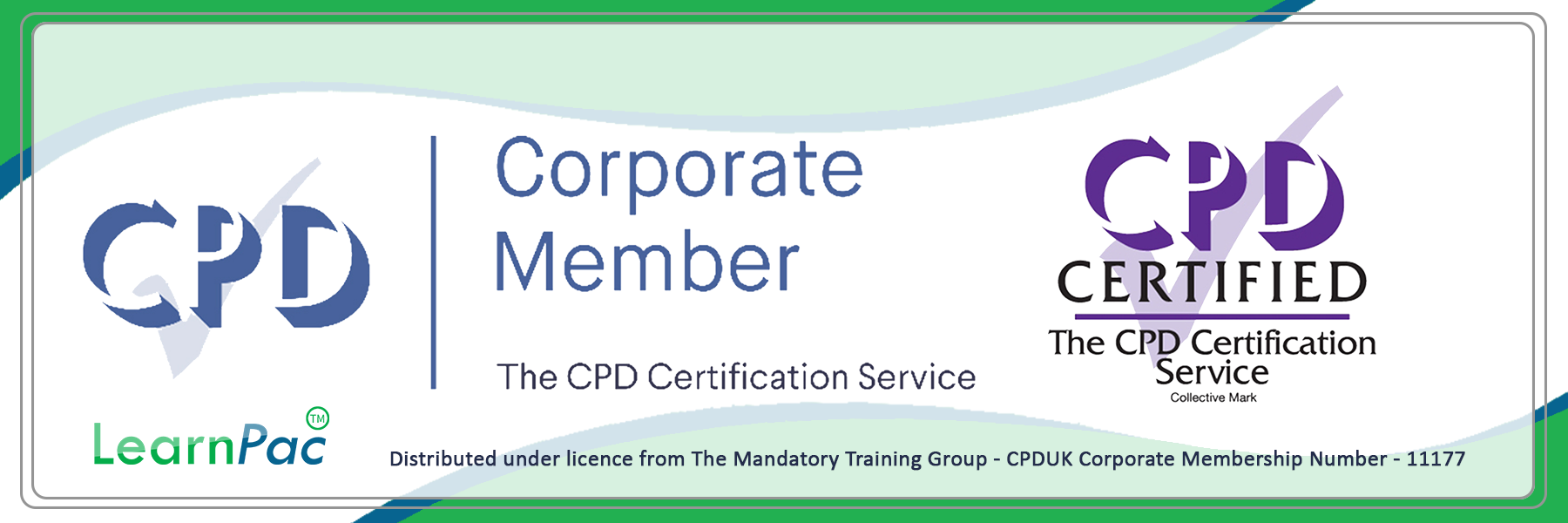Deprivation of Liberty Safeguards - E-Learning Courses - CPDUK Accredited
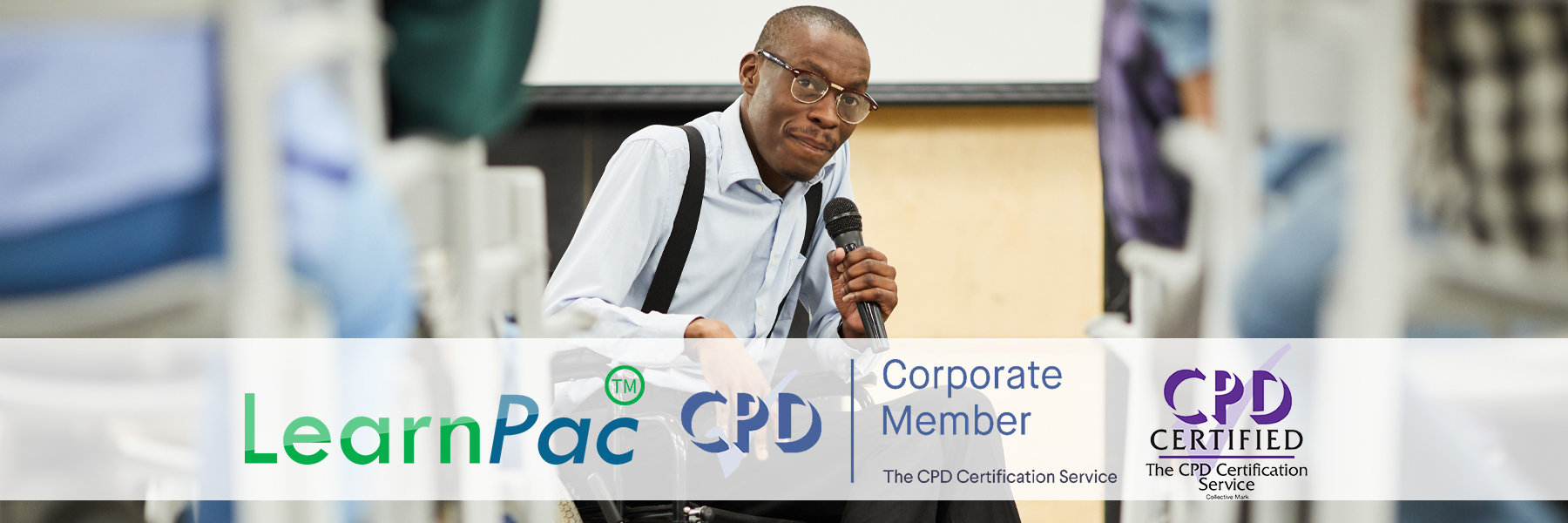
Deprivation of Liberty Safeguards – E-Learning Courses with Certificates – CPDUK Accredited.
LearnPac Systems is the leading UK provider of accredited statutory and mandatory training courses for all sectors, including health and social care, education, local government, private and charity sectors.
Deprivation of Liberty Safeguards E-Learning courses explains what needs to be done before authorising a deprivation of liberty. It has been designed to be used by anyone who cares for someone who may lack the mental capacity to make decisions for themselves.
Our Deprivation of Liberty Safeguards (DoLS) eLearning courses provides the necessary actions to protect vulnerable people who lack the capacity to consent to the care or treatment they need, especially in hospitals or care homes and in circumstances that amount to a deprivation of their liberty.
Browse our Deprivation of Liberty Safeguards - E-Learning Courses
-

Improving Self-Awareness Training – Online Course – CPD Accredited
£ 19.99 excl. VAT Buy now -
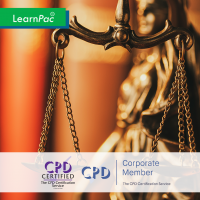
Mental Health Act Training – Level 2 – Online Course – CPD Accredited
£ 19.99 excl. VAT Buy now -
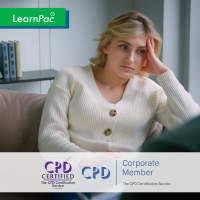
Mental Health Awareness – Online Training Course – CPD Accredited
£ 14.99 excl. VAT Buy now -
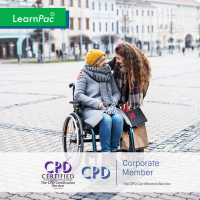
Mental Health, Dementia and Learning Disabilities – Online Course
£ 14.99 excl. VAT Buy now
Deprivation of Liberty Safeguards: Frequently Asked Questions and Answers
Deprivation of Liberty Safeguards – E-Learning Courses with Certificates – CPDUK Accredited – LearnPac Systems UK.
Here at LearnPac Systems, we receive many questions about deprivation of liberty safeguards. We have provided answers to the most frequently asked questions about deprivation of liberty safeguards.
Click on the text below to see the answers to the Frequently Ask Questions about Deprivation of Liberty Safeguards.
The Deprivation of Liberty Safeguards is the procedure prescribed in law when it is necessary to deprive of their liberty a resident or patient who lacks the capacity to comply to their care and treatment in order to keep them safe from harm.
LearnPac Systems is the leading UK provider of accredited statutory and mandatory training courses for all sectors, including health and social care, education, local government, private and charity sectors.
Click here for Safeguarding Adults – Level 3 – Online Training Course – CPD Accredited
Liberty means being free to do the things you want to do and live where you want to live. Hence, deprivation of liberty means taking someone’s freedom away. A recent Supreme Court judgment decided that someone is deprived of their liberty if they are both ‘under continuous supervision and control and not free to leave’.
The Mental Capacity Act 2005 introduced the role of the independent mental capacity advocate (IMCA). IMCAs are a legal safeguard for people who lack the capacity to make specific important decisions, including making decisions about where they live and about serious medical treatment options.
LearnPac Systems is the leading UK provider of accredited statutory and mandatory training courses for all sectors, including health and social care, education, local government, private and charity sectors.
Click here for Mental Capacity Act 2005 – Online Training Course – CPD Accredited
The safeguard aims to protect the interests of an extremely vulnerable group of individuals to ensure they receive the care they need in the least restrictive regimes. It also prevents arbitrary decisions that deprive vulnerable people of their liberty.
The Deprivation of Liberty Safeguards are intended to:
- Protect people who lack mental capacity from being detained when this is not in their best interests
- To prevent arbitrary detention
- To give people the right to challenge a decision.
LearnPac Systems is the leading UK provider of accredited statutory and mandatory training courses for all sectors, including health and social care, education, local government, private and charity sectors.
Click here for Safeguarding Adults and Children – Online Training Course – CPD Accredited
Deprivation of Liberty Safeguards (DoLS) was introduced to fill a significant gap in legislation in protecting those without capacity whose liberty is restricted. They provide authority to restrict movement or detain individuals, but only if necessary in their best interests to prevent them from harm.
Deprivation of Liberty Safeguards (DoLS) protects vulnerable people accommodated in hospitals or care homes in circumstances that amount to a deprivation of their liberty and who lack the capacity to consent to the care or treatment they need.
The supervisory body is the local authority or local health board that is responsible for considering deprivation of liberty request received from a managing authority, commissioning the statutory assessments and, where all the assessments agree, authorising deprivation of liberty.
The six assessments needed to satisfy the requirements of the MCA DOLS (described in paragraphs 4.23 to 4.76 of the Code of Practice).
A DoLS assessment will take place if a person with dementia is in a care home or hospital setting, and it is felt that they are being, or will be, deprived of their liberty. If the person with dementia is living in supported living, there is a different system for having a deprivation of liberty authorised.
Implementing a best interests assessment is a complex but vital task. Its purpose is to decide whether a deprivation of liberty is happening and if it happens, whether this is in the best interests of the person affected.
DoLS ensures people who cannot consent to their care arrangements in a care home or hospital are protected if those arrangements deprive them of their liberty. Arrangements build up to check they are necessary and in the person’s best interests.
It is a little known fact that an individual who was unlawfully denied their liberty has a right to compensation. Compensation should be awarded to an individual if the relative deprivation of liberty process failed to act and, as a result, the individual was wrongly deprived or was excessively restricted.
The Deprivation of Liberty Safeguards (DoLS) can only apply to people who are in a care home or hospital, as well as when there are plans to move a person to a care home or hospital where they may deprive of their liberty.
The managing authority is the person or body with management responsibility for the hospital or care home in which a person is, or may become, deprived of their liberty.
DoLS assessments are carried out by at least two people, such as the best interests assessor and the mental health assessor.
Assessments must be completed within 21 days or before urgent authorisation expires. If a DoLS authorisation is granted, it must state how long it lasts. This can be up to a maximum of 12 months, and any conditions must be attached.
The managing authority itself grants urgent authorisations. There is a form that they have to complete and send to the supervisory body. The managing authority can deprive a person of their liberty for up to seven days using an urgent authorisation.
The Deprivation of Liberty Safeguards Code of Practice (‘the Code’) has guidance for care homes and hospitals on how to avoid an unlawful deprivation of liberty and how to act in your best interests. leo.
The DoLS training has been designed to be used by anyone who cares for someone who may lack the mental capacity to make decisions for themselves. There were 227,400 applications for DoLS received during 2017-18, with almost three quarters relating to people aged 75 and over.
The DoLS authorisation gives us the power to deprive someone aged 18 or over of their liberty, in a hospital or care home, as long as they are unable to consent to be there, to be given necessary care or treatment.
Examples of people who may lack capacity include those with:
- Dementia
- A severe learning disability
- A brain injury
- A mental health illness
- A stroke
- Unconsciousness caused by an anaesthetic or sudden accident.
The majority of people who will require the protection of the DoLS are those people with more severe learning disabilities, older people with any of the range of dementias or people with neurological conditions such as brain injuries.
This online DoLS Training explains what needs to be done before authorising a deprivation of liberty. It has been designed to be used by anyone who cares for someone who may lack the mental capacity to make decisions for themselves.
No, it is not the same as being detained under the Mental Health Act 1983. You do not need to have treatment for a mental health problem to be deprived of your liberty. You can be deprived of your liberty to keep you safe, or for treatment of other health problems.
The Mental Capacity Act Deprivation of Liberty Safeguards (MCA DoLS) came into force on 1 April 2009. It provides a legal framework to ensure people are deprived of their liberty only when there is no other way to care or treat them safely.
LearnPac Systems is the leading UK provider of accredited statutory and mandatory training courses for all sectors, including health and social care, education, local government, private and charity sectors.
Click here for more Deprivation of Liberty Safeguards E-Learning Courses
On successful completion of each of the deprivation of liberty safeguards courses modules, you will be able to download, save and/or print a quality assured continuing professional development (CPD) certificate. Our CPD certificates are recognised internationally and can be used to provide evidence for compliance and audit.
The CPD Certification Service (CPDUK) accredits all of our statutory and mandatory training courses as conforming to universally accepted Continuous Professional Development (CPD) guidelines.
LearnPac Systems is distributed under the licence from The Mandatory Training Group – CPDUK Corporate Memebrship Number – 1117.
